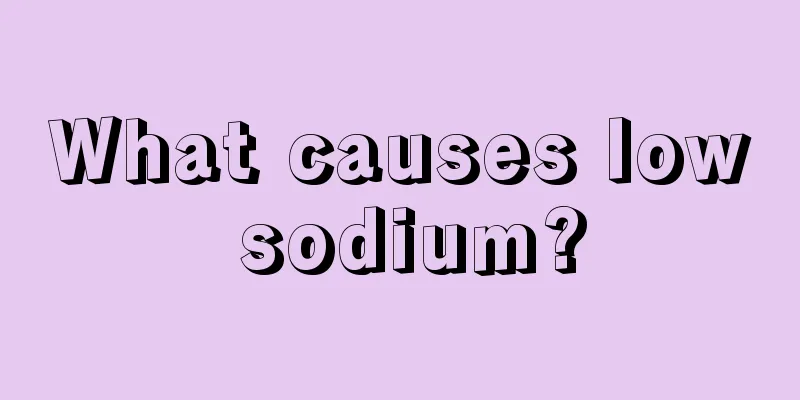What causes low sodium?

|
The human body needs a variety of trace elements, which together ensure the normal functioning of the human body. If the sodium element is too low, the osmotic pressure will be too low, leading to excessive dehydration of the body. Generally, when you have a fever, your sodium level will decrease, and you need to supplement it with sodium. There are many ways to supplement sodium, and the most common way is to supplement it with normal saline. So, what are the common causes of low blood sodium? The three types of hyponatremia have different causes, as described below: 1. Hyponatremia with decreased total sodium When body fluid loss occurs, solute loss exceeds water loss, which is called hypotonic dehydration. This situation occurs when sodium loss is greater than water loss, and occurs in both extrarenal loss and renal sodium loss. It can be distinguished based on the urinary sodium excretion situation. Urinary sodium concentration Na+>20mmol/L indicates increased renal sodium loss, and <20mmol/L indicates extra-renal loss. (1) Causes of renal sodium loss: ① Use of diuretics and dehydrating agents; ② Mineralocorticoid deficiency, which reduces sodium reabsorption by the renal tubules; ③ Tubulointerstitial disease, polyuria in acute kidney injury, early stage after relief of urinary tract obstruction, hypoaldosteronism, etc.; ④ Significant increase in blood sugar, ketonuria, etc. (including diabetic ketoacidosis, starvation, and alcoholic ketonuria). (2) Causes of extrarenal sodium loss: ① Gastrointestinal loss, such as vomiting, diarrhea, third compartment fluid retention, burns, pancreatitis, pancreatic fistula, and bile fistula; ② Cerebral salt-wasting syndrome: hyponatremia caused by central nervous system damage such as intracranial tumors, hemorrhage, and trauma. 2. Hyponatremia with normal total sodium (1) When glucocorticoid deficiency causes adrenal cortex insufficiency, aldosterone secretion decreases, causing increased excretion of water and sodium. The decrease in cortisol can promote the secretion of antidiuretic hormone (ADH), causing a decrease in water excretion. (2) Hypothyroidism reduces cardiac output and glomerular filtration rate, leading to disorders in the ADH-mediated renal mechanism. On the one hand, cardiac output and glomerular filtration rate decrease, causing a decrease in urine volume. On the other hand, the effective blood volume decreases, stimulating the release of ADH through the effect of baroreceptors. (3) Acute schizophrenia is prone to hyponatremia, and the mechanism is multifactorial, including increased thirst (polydipsia), mild defects in osmotic pressure regulation of ADH release, ADH release under low plasma osmotic pressure, increased renal ADH responsiveness and antipsychotic drugs. (4) The mechanism of drug-induced hyponatremia is ADH-mediated, either increasing ADH release or enhancing the effect of ADH. (5) In the syndrome of excessive ADH secretion (SIADH), the Na+ concentration in urine is often >20mmol/L. 3. Hyponatremia with increased total sodium Although patients with this type of hyponatremia have increased overall sodium, their blood sodium is reduced due to water retention in the body. |
<<: Being too honest, what caused it
>>: People's faces change every few years
Recommend
What should I do if I have back pain and stomach pain during menstruation?
The menstrual period is a very critical period fo...
What foods should patients with nasopharyngeal cancer avoid eating
The human stomach is not a trash can, and you can...
The health benefits of meridian massage
In our lives, most people pay more attention to h...
There is a lump on my chest and it hurts a bit when I press it
The chest is the place closest to the heart. If t...
What to do if your back is cold and painful?
There are many reasons for back pain. The most co...
What's the matter with rough nails
The human body needs to be replenished with some ...
How to remove lead and mercury spots on the face
Love of beauty is women's nature. In order to...
Which one is better for the stomach, black tea or Pu'er tea?
Due to the profoundness of my country's tea c...
How to check for early breast cancer
Like other malignant tumors, we can hardly see an...
People usually find kidney cancer from blood in the urine
People usually find kidney cancer from blood in u...
What are the wonderful uses of white sugar
White sugar is a common seasoning and we use it i...
Ten signs of depression that should not be ignored!
As material prices continue to rise in real life,...
Can coix seed be soaked in water and drunk?
It is okay to use coix seed to soak in water and ...
How do patients with bile duct cancer exercise?
Many cancer patients may already be tired of stay...
Drugs for bipolar disorder
Bipolar disorder, also known as manic depression,...









